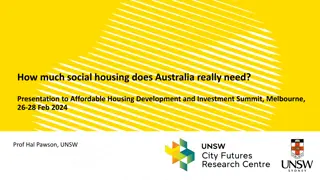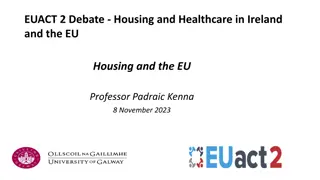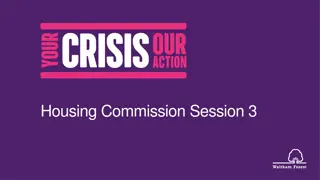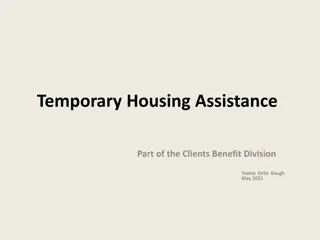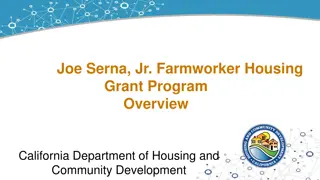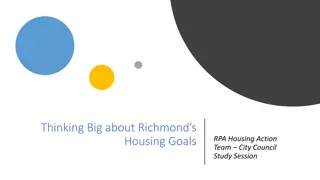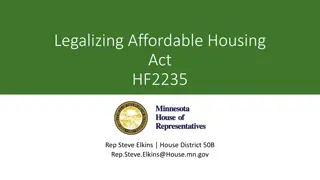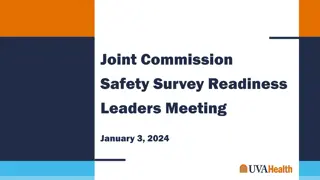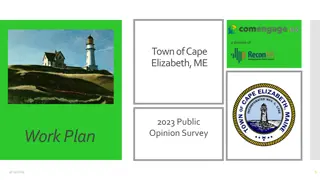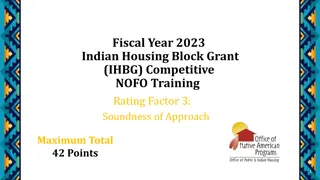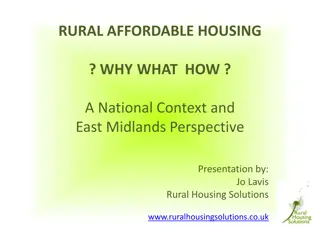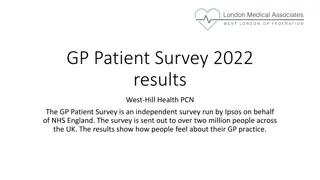Regulator of Social Housing Stakeholder Survey Results 2022-2023: Key Findings and Insights
The Regulator of Social Housing conducted a stakeholder survey in 2022-2023, gathering insights from registered providers and other stakeholders. Key findings indicate positive perceptions of the regulatory framework, delivery practices, and future plans. Stakeholders appreciate the usefulness of RSH publications and confidence in regulatory actions. Different stakeholder groups have varying levels of positivity, with for-profit providers expressing strong agreement with RSH objectives and practices.
Download Presentation

Please find below an Image/Link to download the presentation.
The content on the website is provided AS IS for your information and personal use only. It may not be sold, licensed, or shared on other websites without obtaining consent from the author. Download presentation by click this link. If you encounter any issues during the download, it is possible that the publisher has removed the file from their server.
E N D
Presentation Transcript
Stakeholder survey results 2022-2023 May 2023
Introduction The Regulator of Social Housing has carried out a stakeholder survey, with fieldwork completed in March and April 2023. We have sought the views of registered providers and other stakeholders on a range of issues. We will use the results to inform our performance monitoring continuous development of our operational approach our corporate planning Our last stakeholder survey was published in 2022. In 2022 we changed the methodology we use in our survey to better reflect best practice. This included the addition of neutral or not applicable options for questions with choice scales. Regulator of Social Housing May 2023 2
Key findings The number of stakeholders responding to the survey continues to rise with 435 responses received this year, up from 409 in 2022. As in previous years, the majority of responses were from registered providers (RPs) however there has been an increase in the number of tenants taking part. This change in profile can have an impact on overall scores, even where individual stakeholders are no more or less satisfied. Regulatory framework The results remain positive, with at least seven in ten respondents agreeing that: Our approach is co-regulatory The regulator meets it s objectives to be proportionate and minimise interference The regulatory framework and our approach to regulation are consistent with our objectives on both economic and consumer regulation. Delivery and practice Over three quarters of respondents agreed that our approach to regulation is risk-based and assurance-based, and that this approach is reflected in their experience of being a regulated RP or how they understand RPs are regulated. Of those stakeholders that had engaged with us, the vast majority continue to report that our requests for information and/or evidence are clear and that our regulatory staff are knowledgeable about the nature and complexity of the sector. Large PRPs were the most positive, with 93% agreeing. Regulator of Social Housing May 2023 3
Key findings The regulator 76% of respondents said that they find RSH publications very or somewhat useful. 76% agreed that we take action where possible to ensure that confidence in the sector is maintained, and access to finance on competitive terms continues. 77% agreed that we take appropriate action in line with our current remit. Looking ahead, 84% were aware of our proposal plan for implementing the Social Housing Regulation Bill, and 78% of respondents were confident that we will deliver the regulatory changes set out in the Bill. For information sharing, direct contact by letter or email remains the most preferred method followed by the website and stakeholder events. Perceptions by stakeholder group Large private registered providers (large PRPs) and local authority registered providers (LARPs) were generally the most positive across the results whilst other stakeholders were positive overall. Private registered providers were the most positive about us meeting our objectives. Looking at the breakdown of registered providers, in general for-profit registered providers were the most positive. 82% of for-profit registered providers agreed that we are meeting our objectives and 86% agreed that our regulation is risk-based and assurance-based, and that this is reflected in their experience of being a registered provider. Regulator of Social Housing May 2023 4
Responses 435 stakeholders completed the survey, 26 more than in 2022. Over three quarters of respondents (336, 77%) were registered providers, including local authority registered providers. This compares to 81% in 2022, with a greater number of individual tenants completing the survey this year (32 took part in 2022). This change in profile can have an impact on overall scores, even where individual stakeholders are no more or less satisfied. Other stakeholders who responded include: lenders, investors, or credit rating agencies, government departments, individual tenants, tenant organisations, and trade bodies. Which of these stakeholder groups best describes your organisation? Proportion of respondents by stakeholder group Proportion of responses Responses Large Private Registered Provider Large Private Registered Provider 154 35% Small Private Registered Provider Individual tenant Small Private Registered Provider 141 32% Local Authority Registered Provider Government department Individual tenant 42 10% Local Authority Registered Provider 41 9% Lender, investor or credit rating agency Tenant organisation Government department 14 3% Lender, investor or credit rating agency 10 2% Trade body Tenant organisation 9 2% Other individual Trade body 5 1% Other individual 3 1% Other Other 16 4% Regulator of Social Housing May 2023 5
Profile of registered provider respondents Of the registered providers that responded, 154 were large private registered providers (PRPs) (>1,000 units), and 141 were small PRPs (<1,000 units). A further 41 responses were from local authority registered providers (LARPs), an increase from 28 LARP responses in 2022. We have separated out LARPs in our analysis. 72% of provider respondents classified themselves as housing associations (the same proportion as in 2022), 28 were almshouses, 18 for-profit providers and 6 were ALMOs. How many homes does your provider own? What type of provider is your organisation? 160 141 0 50 100 150 200 250 300 140 Housing association 243 120 100 88 Local authority 41 80 60 Almshouse charity 28 41 41 40 For-profit provider 18 13 12 20 Arms-length management organisation (ALMO) 0 6 <1,000 units 1,000 - 9,999 units 10,000 - 29,999 units 30,000 - 49,999 units 50,000+ units Local authority Regulator of Social Housing May 2023 6
Section 1 Regulatory framework Question 4: To what extent do you agree that: Question 4 responses 60% 52% 50% 50% 49% 49% the regulator s approach is co-regulatory 50% a 40% the regulator meets its objectives to be proportionate and minimise interference b 30% 25% 24% 23% 22% 22% 21% 20% 21% 20% 20% 20% the regulatory framework and our approach to regulation are consistent with our objectives on economic regulation 10% 6% 4% 4% 3% 3% c 3% 3% 2% 3% 3% 0% a b c d Overall the regulatory framework and our approach to regulation are consistent with our current objectives on consumer regulation Strongly agree Agree Neutral Disagree Strongly disagree d Overall, 72% of respondents agreed with these statements, with 7% disagreeing. In 2022, these were 79% and 5% respectively. Large PRPs were the most positive across the statements (79%), followed by small PRPs (70%) and LARPs (67%). Regulator of Social Housing May 2023 7
Section 2 Delivery and practice Question 5: To what extent do you agree that: Question 5 responses 60% 52% 52% 52% our approach to regulation is risk-based and assurance-based? 50% a. 40% 30% 24% 23% 23% this approach is reflected in your experience of being a regulated RP or how you understand RPs are regulated? 19% 19% 18% 20% 10% b. 3% 3% 3% 3% 3% 2% 0% a b Overall Strongly agree Agree Neutral Disagree Strongly disagree Overall, 76% of respondents agreed with these statements. 19% of respondents were neutral and only 6% dissatisfied. By stakeholder group, large PRP s were the most positive (85%). Question 5 by stakeholder group (% agree) 85% 84% Large PRP 72% Small PRP 74% 78% LARP 68% 66% 66% Other 0% 10% 20% 30% 40% 50% 60% 70% 80% 90% a b Regulator of Social Housing May 2023 8
Section 2 Delivery and practice (RPs only) Question 7 responses Question 7 47% 50% When we request information and/or evidence from you, how clear do you find our request? 41% 40% 30% 20% 9% 10% 3% 1% 0% Overall, 87% of registered providers were very or somewhat clear about the information or evidence requested. Just 4% of respondents felt it was not clear. Just two registered providers (0.6%) felt requests were not clear at all . Very clear Somewhat clear Neutral Not very clear Not clear at all Question 7 by stakeholder group Large PRP 54% 40% 3% 1% 1% Small PRP 44% 36% 14% 6% LARP 28% 59% 10% 3% 0% 10% 20% 30% 40% 50% 60% 70% 80% 90% 100% Very clear Somewhat clear Neutral Not very clear Not clear at all Regulator of Social Housing May 2023 9
Section 2 Delivery and practice (RPs only) Question 8 responses Question 8 60% From engaging with our regulatory staff, how knowledgeable are they about the nature and complexity of the sector? 50% 50% 40% 35% 30% 20% 10% 10% 4% 85% of registered providers agreed that the regulator s staff are knowledgeable about the nature and complexity of the sector. Large PRPs were the most positive with 93% agreeing. LARPs and small PRPs had high proportions of neutral responses, which may reflect the different levels of engagement experienced by these groups. 0% Very knowledgeable Somewhat knowledgeable Neutral Requires improvement Question 8 by stakeholder group Large PRP 54% 39% 3% 4% Small PRP 47% 30% 18% 5% LARP 44% 35% 18% 3% 0% 10% 20% 30% 40% 50% 60% 70% 80% 90% 100% Very knowledgeable Somewhat knowledgeable Neutral Requires improvement Regulator of Social Housing May 2023 10
Section 2 Delivery and practice (Non-RPs only) 67% of non-registered provider respondents had engaged with RSH staff in the past year. Question 10 Have you engaged with RSH staff in the past year, for example at an event, in a meeting, by email or phone call? Of those, 94% agreed that the regulator s staff are knowledgeable about the nature and complexity of the sector. The remaining respondents were neutral . Question 11 In your experience, how knowledgeable are our staff about the nature and complexity of the social housing sector? Question 11 responses 90% 78% 80% 70% 60% 50% 40% 30% 16% 20% 6% 10% 0% 0% Very knowledgeable Somewhat knowledgeable Neutral Requires improvement Regulator of Social Housing May 2023 11
Section 3 The regulator On average, 76% found RSH publications very or somewhat useful and only 5% found them not useful. This is broadly in line with 2022 (78%). Question 13 Please indicate how useful you find the following publications: The Codes of Practice and Regulating the Standards were found to be the most useful (87%), whilst 55% found the Sector Risk Profile very useful . Very useful Somewhat useful Neutral Not very useful Not at all useful 60% 55% 54% 50% 48% 48% 50% 45% 45% 45% 44% 42% 40% 37% 37% 35% 33% 31% 30% 29% 30% 29% 29% 30% 26% 20% 15% 10% 0% Annual Report and Accounts* Codes of Practice Consumer Regulation Review Fees Global Accounts Quarterly Survey Regulating the Standards Regulatory judgements / notices Sector Risk Profile Statistical Data Return Value for money reports Statement Very or somewhat useful: 71% 87% 84% 58% 60% 75% 87% 82% 84% 78% 75% Regulator of Social Housing May 2023 12 *Accounts added to this question in 2023, previously has been Annual Report only.
Section 3 The regulator Responses differed by stakeholder group, as would be expected given the different focus of stakeholders: Very or somewhat useful Large PRP Small PRP LARP Other Annual Report and Accounts* 77% 61% 68% 75% Almost all large PRPs (96%) find the Sector Risk Profile very or somewhat useful, with 77% finding it very useful. The vast majority of large PRPs also find Regulating the Standards and the Quarterly Survey and Consumer Regulation Review useful. Codes of Practice 90% 86% 85% 83% Consumer Regulation Review 91% 76% 88% 82% Fees Statement 61% 61% 33% 57% For small PRPs the Codes of Practice, Regulating the Standards and the Consumer Regulation Review are the most useful publications. Global Accounts 88% 39% 26% 60% Quarterly Survey 91% 60% 64% 76% The same publications were found to be the most useful amongst LARPs, with 43% finding the Consumer Regulation Review very useful. Regulating the Standards 95% 80% 90% 82% Regulatory judgements/ notices 91% 70% 82% 85% Other stakeholders found the Codes of Practice and Regulating the Standards most useful, followed by the Sector Risk Profile. Over half of other stakeholders find the Sector Risk Profile, Consumer Regulation Review and Regulatory judgements/notices very useful. Sector Risk Profile 96% 73% 79% 82% Statistical Data Return 83% 73% 76% 77% Value for money reports 83% 69% 66% 75% Overall 86% 68% 69% 76% Regulator of Social Housing May 2023 13
Section 3 The regulator Question 14 responses Question 14 48% 50% To what extent do you agree or disagree that we take action where possible to ensure that confidence in the sector is maintained, and access to finance on competitive terms continues? 45% 40% 35% 28% 30% 25% 20% 20% 15% 10% 3% 5% 1% 0% Overall, 76% of respondents agreed with this statement with only 4% disagreeing. Strongly agree Agree Neutral Disagree Strongly disagree Question 14 by stakeholder group Agreement has fallen slightly since 2022 (79%), however this is due to a higher proportion of neutral responses. Large PRP 34% 48% 13% 4% Small PRP 19% 49% 29% 3% LARP 29% 54% 12% 2% Large PRPs and LARPs had the highest agreement (82% and 83% respectively). Other 31% 43% 22% 3% 0% 10% 20% 30% 40% 50% 60% 70% 80% 90% 100% Strongly agree Agree Neutral Disagree Strongly disagree Regulator of Social Housing May 2023 14
Section 3 The regulator Overall, 84% said that they were aware of the regulator s proposed plan for implementing the Social Housing Regulation Bill, as set out in our Reshaping Consumer Regulationimplementation plan. Awareness ranged from 94% amongst large PRPs to 76% amongst other stakeholders. Question 15 Are you aware of our proposed plan for implementing the Social Housing Regulation Bill, which we set out in Reshaping Consumer Regulation: Our Implementation Plan? Question 15 by stakeholder group 100% 6% 12% 16% 90% 22% 24% 80% 70% 60% 50% 94% 88% 84% 40% 78% 76% 30% 20% 10% 0% Large PRP Small PRP LARP Other Overall Yes No Regulator of Social Housing May 2023 15
Section 3 The regulator Question 16 responses Question 16 60% 51% How confident are you that we will deliver the regulatory changes set out in the Social Housing Regulation Bill? 50% 40% 27% 30% 17% 20% 10% 5% 1% 0% Very confident Somewhat confident Neutral Not very confident Not at all confident Overall, 78% of respondents were very or somewhat confident that the regulator will deliver on the regulatory changes set out in the Social Housing Regulation Bill. Just three respondents (0.7%) were not at all confident . Question 16 by stakeholder group Large PRP 33% 51% 11% 4% 1% Small PRP 14% 57% 24% 5% 1% LARP 51% 37% 5% 7% Other 28% 47% 20% 5% 0% 10% 20% 30% 40% 50% 60% 70% 80% 90% 100% Very confident Somewhat confident Neutral Not very confident Not at all confident Regulator of Social Housing May 2023 16
Section 3 The regulator Question 17 responses Question 17 60% 53% To what extent do you agree or disagree that we take appropriate action in line with our current remit? 50% 40% 30% 24% 19% 20% 10% 3% 0% 0% Strongly agree Agree Neutral Disagree Strongly disagree Overall, 77% of stakeholders agreed with this statement. Just two respondents strongly disagreed. Question 17 by stakeholder group Large PRP 32% 53% 11% 3% 1% The highest level of agreement was amongst LARPs (88%), followed by large PRPs (84%). Small PRP 16% 55% 28% 2% LARP 24% 63% 7% 5% Other 23% 48% 24% 4% 0% 10% 20% 30% 40% 50% 60% 70% 80% 90% 100% Strongly agree Agree Neutral Disagree Strongly disagree Regulator of Social Housing May 2023 17
Section 3 The regulator Question 18: Which of the following do you find helpful in getting information about the requirements of our standards, publications and any other news? Direct contact by letter or e-mail remains the communication method found most useful by stakeholders. Very or somewhat helpful Letter / email 92% Views were more mixed on social media, with only 34% finding Twitter or LinkedIn posts very or somewhat helpful and 4% finding this method of communication unhelpful. Website information / alert 79% Stakeholder event 69% Trade press article / column 69% These findings are broadly in line with 2022. Twitter/ LinkedIn 34% Question 18 responses 70% 63% 60% 49% 50% 43% 40% 39% 35% 40% 34% 29% 30% 25% 24% 21% 21% 17% 15% 20% 10% 7% 6% 6% 10% 5% 4% 4% 2% 1% 1% 0% 0% Letter / email Website information / alert Stakeholder event Trade press article / column Twitter / LinkedIn post Very helpful Quite helpful Neutral Not very helpful Unhelpful Regulator of Social Housing May 2023 18
Regulator of Social Housing 0300 124 5225 enquiries@rsh.gov.uk www.gov.uk/rsh twitter.com/rshengland www.linkedin.com/company/regulator-of-social-housing The Regulator of Social Housing regulates registered providers of social housing to promote a viable, efficient and well-governed social housing sector able to deliver homes that meet a range of needs. Regulator of Social Housing May 2023 19







